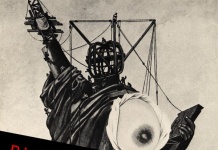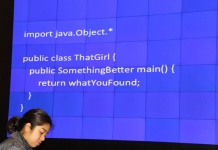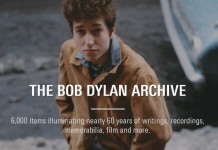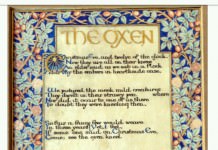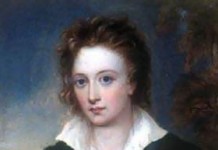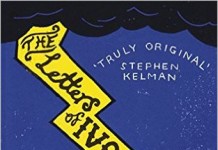 At this year’s Edinburgh International Book Festival, I spoke to Claire Askew, runner-up for the inaugural Edwin Morgan Poetry Award for her unpublished collection ‘This changes things”. She received the £1000 ($1660) awarded to all shortlisted poets, “and a further amount to support her work towards publication.” Judge Stewart Conn praised her “voice that is arrestingly and distinctively her own… words and imagery constantly seeming fresh-minted.” I spoke to her about the Award, her work, and modern Scottish poetry.
At this year’s Edinburgh International Book Festival, I spoke to Claire Askew, runner-up for the inaugural Edwin Morgan Poetry Award for her unpublished collection ‘This changes things”. She received the £1000 ($1660) awarded to all shortlisted poets, “and a further amount to support her work towards publication.” Judge Stewart Conn praised her “voice that is arrestingly and distinctively her own… words and imagery constantly seeming fresh-minted.” I spoke to her about the Award, her work, and modern Scottish poetry.
TeleRead: To what extent do you find yourself working within a specifically Scottish tradition?
Claire Askew: I definitely do. I’m an interesting person to talk about Scottishness with because I very much identify myself as a Scot, although I have this sort of pesky pseudo-English accent which means other people sometimes have difficulty identifying me as a Scot. Sometimes I’m a Scottish poet, sometimes – although I never do this myself – I get called an English poet by other people, but I feel very much like I am working within a tradition of Scottish poets, and Scottish female poets particularly. So the poets who influenced my work are people like Liz Lochhead and Carol Ann Duffy, who are taught in high schools across the country, and who were my first introduction to poetry by women. And also more recently, Scottish performance poets have been very much part of my consciousness: people like Jenny Lindsay who is a massive presence on the Scottish poetry performance scene, then lesser known people like Camilla Chen, who is not from Scotland but who lives in Scotland. So it’s a slightly odd tradition I’m worming my way into but it’s definitely a very female one. I’m interested in women’s writing, and you can’t go that far back with women’s writing: there aren’t those foremothers in Scotland.
TeleRead: Has anyone actually publicly questioned your voice?
Claire Askew: There was mention made of it on a poets’ chatroom forum when I was still very green and new to this stuff and was an undergraduate at the University of Edinburgh. This debate started without my knowledge as to whether I should be allowed to call myself a Scottish poet. And I came along and quite stridently defended my right to call myself a Scot. I am actually a direct descendant of the great Border reiver Johnie Armstrong. I can trace it all the way back. And know I’m a bit more known about the place, and have this online presence, one of the things I talk about quite a lot is struggling with where I’m from and where I belong … And it’s now quite publicly known how I feel about it, and people don’t ask any more.
TeleRead: What do you think of whether or not a specifically female sensibility influences formal and technical areas in terms of what you want to develop?
Claire Askew: I’m very interested in where page meets stage. I’ve dipped my toe in the poetry performance side of things and competed in slams, won slams, and am very interested in this divide between page and stage. When I first started doing slams, I thought this divide doesn’t exist: I’m what most people would call a page poet, and yet I’m still able to hop across and win slams. But more recently, I’ve started to realize that there is an issue on both sides with performance poets. Recently some Scottish performance poets have publicly taken exception to people who perform off a piece of paper. Similarly I’m aware that there are really great performance poets in Edinburgh who don’t seem to get booked for more “traditional” readings. So I’m starting to see that there is a divide. But now I’m really interested in that, and why there is a divide, and why a great performance poem won’t make a good page poem. I don’t have answers to those questions, but I’m interested in exploring them.
TeleRead: What about the way English gets words down on paper and how that might affect how Scots is written down versus standard English?
Claire Askew: Possibly. Thinking about the poets in the performance scene at the moment who are very successful, not many of them are performing in Scots. Perhaps there is something in that, but I think it’s not being exploited as much as it could be. I’d like to see more performance in Scots. But I think some performance poets might be worried about alienating their audience.
TeleRead: As a performance poet, do you find there’s a lot of interest to get you out there to draw people in to greater literary awareness?
Claire Askew: Definitely. People tend to like to talk about how poetry is a dying art and there are no readers and sales are down and it’s only about 1 percent of book publication. But I do loads of community work, and what I’ve found is that community organizations the world over love poetry. They think it’s a really good art form to work with because it’s short, it’s a really good way to get people who might otherwise not get very into literature or might have issues about what they want to write out, and poetry is a good way to do that. I do a lot of work with women’s groups, and quite often the participants will say: don’t like poetry, did it at school and didn’t like it; but then after about half an hour, they are totally enthused with it. It’s an art form you can give to people who would be far too intimidated to attempt [to read] a novel, and they will run with it.
TeleRead: What do you think of Edwin Morgan himself and his legacy as a poet?
Claire Askew: Edwin Morgan is someone I have known since before I could read, since my dad, instead of reading me children’s stories, used to read me poems, and one of my earliest memories is him trying to get his head around “The Computer’s First Christmas Card” and read me that, out of this anthology of children’s poems edited by Michael Rosen, which I still have. So Edwin Morgan has been in my life since I was a tiny wee little girl. I’m the biggest fan of his there could be. What he’s done for Scottish poetry can’t even be measured.


















